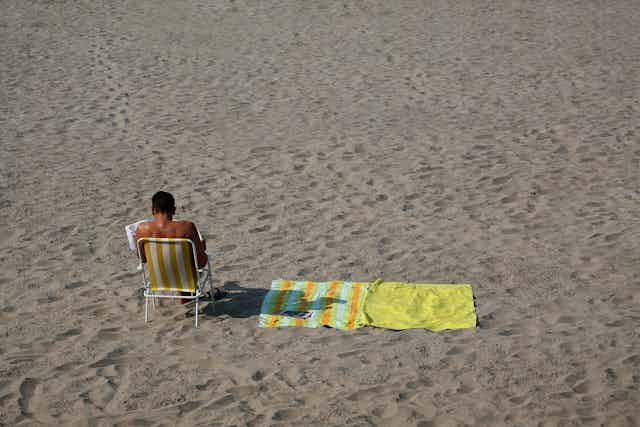Hell is not, as Sartre suggested, other people – it’s a holiday without books. Holidays, with their promise of carefree pleasure seeking, might seem like the most materialistic of activities. Yet the name has sacred roots: the holy day suggests a time set apart from the ordinary flow of life.
I can tolerate zigzag queues and disappointing hotel rooms but a lack of literature would ruin my trip. For some of us there is no greater pleasure, or more sacred thing, than the imaginative travel afforded by a good book.

The great philosopher Blaise Pascal believed that human misfortune was the result of other people’s inability “to sit quietly in one’s room”. I’m not sure where Pascal liked to spend his summer break – Disneyland Paris hadn’t opened its gates in the 1600s – but if forced to leave the tranquillity of his room for adventure and the promise of ice cream, it’s probable that he would have filled his suitcase with literature as well as factor 50. And, if he were to ask for a few suggestions, I might recommend this mini-library of my all-time holiday reading favourites. Take note, if you want a real break on your travels.
First chapter
Clive James’s absurdly funny and sad Unreliable Memoirs (1980) is the first book that I remember reading on a beach. I was 16 and should have been focusing on other things, like the exhilarating surf and real human beings, but this “novel disguised as an autobiography” snagged me and encouraged a lifelong belief that words placed in the right order are a kind of magic.
James’s rites of passage tales of suburban Sydney in the 1940s and 1950s are intense in their specificity, evoking a distant world and way of life. But his askew take on the ritual humiliations and surprising freedoms of childhood are so resonant that they might connect with anybody who remembers what it is to be young, awkward and excessively bookish.

The family saga
This evocation of the idiosyncrasies of family life anticipates the fiction of James’ fellow Australian, Tim Winton. I especially recommend Cloudstreet (1991), now widely regarded as a classic of world literature, which follows the fortunes of two families who are compelled by separate losses to share a house for two decades.
Winton writes with a distinctive lyricism about Western Australia but this is also a compelling family saga of the pious, industrious Lambs and their worldly, fortune-seeking peers, the Pickles. There are few better writers of landscape and this is a visceral narrative full of elemental detail, salty humour and raw feeling.
The page turner
Ben Aaronovitch’s Rivers of London (2011) is likely to prompt less refined reader responses: fear, laughter and the need-to-know-what-happens-next are the big pleasures in the first of a rather Dickensian sequence that blends police procedural with the supernatural.
PC Peter Grant, a rare fictional detective who seems to be perfectly sociable, becomes a kind of wizard’s apprentice in the Met and investigates crimes that leave his peers clueless. The genre term “urban fantasy” may discourage but this is witty, smart contemporary fable that represents a mischievous rewriting of the rules of classic detective fiction.

The tome
A long break might create space to grapple with one of the big books of our time: Donna Tartt’s ambitious The Goldfinch (2013), which blends art, obsession and the search for home, is perhaps the closest thing to the experience of reading a 19th-century triple-decker published in recent years; it is rich with character, incident, plot twist and, yes, many pages. I found it utterly absorbing and the fact that it isn’t brief is part of the pleasure.
When homesick
Holidays might encourage escape from everyday life but they’re also a good opportunity to reflect on our understanding of home and belonging. Marilynne Robinson’s Gilead (2004), is a kind of hymn to the joys of not travelling: John Ames, a minister facing up to mortality, reflects on the ordinary mysteries of life in the titular mid-Western town in a series of letters to his young son.
Robinson, in common with otherwise very different novelists such as John Irving and Stephen King, is brilliant at world building. We might have little in common with a Calvinist minister living in 1950s Iowa but Robinson opens up his particular world in a way that encourages both thought and emotional connection. Gilead offers an alternative take on the velocity (and restlessness) of contemporary Western life.
In her brilliant poem, Questions of Travel (1956), partly inspired by Pascal’s defence of staying put, Elizabeth Bishop asks: “Should we have stayed at home, wherever that may be?” If you are similarly sceptical about tourism, I recommend this pile of books and the out-of-office reply as an alternative trek into new lands.

